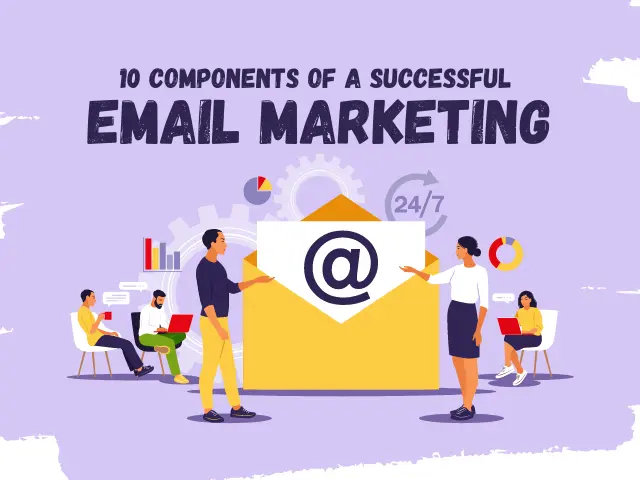10 Components of a Successful Marketing Email
Email marketing is a powerful digital marketing strategy that involves sending emails to a targeted audience with the goal of promoting products, services, or building relationships. In this article, we will explore the ten essential components needed to create a successful email marketing campaign. Whether you’re new to email marketing or looking to enhance your existing strategy, these tips will help you optimize your campaigns and achieve better results.

Here, 10 Components of a Successful Marketing Email is following-
1. Clearly Defined Goals
Before starting any email marketing campaign, it’s important to set clear and measurable goals. What would you like to achieve through your email campaign? Are you looking to increase website traffic, generate leads, promote a new product, or nurture customer relationships? By defining your goals from the start, you can tailor your campaign strategy accordingly and track your progress effectively.
2. Targeted Email List
Building a targeted email list is essential to a successful email marketing campaign. Instead of blasting your emails to a generic audience, focus on segmenting your contacts based on their interests, demographics, or past interactions with your brand. This enables you to send personalized and relevant content, increasing the chances of engagement and conversions.
3. Compelling Subject Lines
Subject lines play a pivotal role in grabbing the attention of your recipients and enticing them to open your emails. Craft compelling subject lines that are concise, and intriguing, and convey the value or benefit of your email content. Avoid generic or spammy subject lines that may lead to your emails being ignored or marked as spam.
4. Engaging Email Content
Once your emails are opened, it’s crucial to deliver engaging and valuable content. Use a conversational tone and write content that resonates with your audience. Incorporate storytelling, visuals, and multimedia elements to make your emails more captivating. Remember to keep your emails concise, focusing on a single topic or call to action to maintain clarity and avoid overwhelming your readers.
5. Mobile-Friendly Design
With the increasing use of mobile devices, optimizing your email campaigns for mobile is no longer optional but essential. Ensure that your emails are responsive and display properly on different screen sizes. Use a clean and visually appealing design that enhances readability on mobile devices. Test your emails across various email clients and devices to ensure a seamless experience for your recipients.
6. Persuasive Call to Action (CTA)
A persuasive call to action is a vital component of a successful email marketing campaign. Clearly state what action you want your recipients to take and make it easy for them to do so. Use action-oriented language and place your CTA prominently within your email. Whether it’s making a purchase, signing up for a webinar, or downloading an e-book, a compelling CTA can significantly impact your campaign’s conversion rate.
7. Personalization and Automation
Email personalization goes beyond addressing recipients by their first names. Leverage the data you have on your subscribers to create highly personalized experiences. Segment your list further based on purchase history, browsing behavior, or engagement level to deliver targeted and relevant emails. Automation tools can help you streamline your campaigns and send timely emails based on specific triggers or actions taken by your subscribers.
8. A/B Testing
To optimize your email marketing campaign, it’s crucial to conduct A/B testing. Test different elements such as subject line, email body, visuals, CTA, send time, and more to see what resonates best with your audience. Analyze the results and make data-driven decisions to refine and improve your future campaigns continuously.
9. Robust Email Analytics
Tracking and analyzing the performance of your email campaigns is essential for ongoing success. Use email marketing analytics tools to monitor key metrics such as open rates, click-through rates, conversion rates, and unsubscribe rates. Gain insights into your audience’s behavior, preferences, and engagement patterns to make informed decisions and iterate on your strategies.
10. Continuous Optimization and Improvement
Lastly, successful email marketing campaigns require continuous optimization and improvement. Regularly review your campaign metrics, identify areas for enhancement, and experiment with new ideas. Stay ahead of the competition by staying on top of the latest email marketing trends and best practices.
Conclusion
Crafting a successful email marketing campaign involves a strategic approach, attention to detail, and constant refinement. By implementing the ten components outlined in this article, you can create compelling email campaigns that engage your audience, drive conversions, and ultimately contribute to the growth of your business. Remember, each component plays a crucial role in the overall success of your campaign, so take the time to plan, execute, and continuously improve your email marketing efforts.
Ready to get started learning E-Mail Marketing? Register for a free demo
Get more details regarding Powerpoint
Phone no.
9988-500-936
Address
SCF 22, First floor, GTB Market, Khanna
Website
www.microwavecomputer.com
Opening Hours
08:30 am - 06:00 pm
